Default 404 Pages
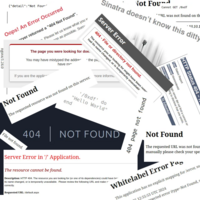
It’s always useful to know as much about the technology stack behind a web application in order to exploit it. One simple way to get information about an application is to look at the 404 not found page. If the site hasn’t created a custom 404 page, it can be used to fingerprint the framework / language being used by the site.
Image Index
Here’s all of the images at the top, linked to their details in the section that follows:
Technologies
nginx
nginx is a reverse proxy / web server / load balancer application. It can be used to serve static pages, or manage various applications running behind it.
The default 404 page looks like:
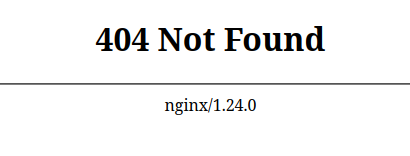
The source is simple:
<html>
<head><title>404 Not Found</title></head>
<body>
<center><h1>404 Not Found</h1></center>
<hr><center>nginx/1.24.0</center>
</body>
</html>
It comes this source code:
static char ngx_http_error_404_page[] =
"<html>" CRLF
"<head><title>404 Not Found</title></head>" CRLF
"<body>" CRLF
"<center><h1>404 Not Found</h1></center>" CRLF
;
Apache / httpd
The Apache httpd web server is similar to nginx in that it is used to serve static pages or to route requests through to the desired backup application. It’s 404 page looks like:
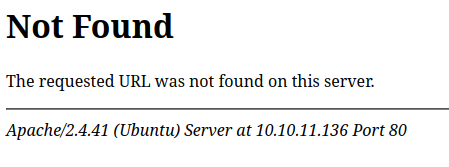
It typically includes the Apache version and OS. The HTML source for this page looks like:
<!DOCTYPE HTML PUBLIC "-//IETF//DTD HTML 2.0//EN">
<html><head>
<title>404 Not Found</title>
</head><body>
<h1>Not Found</h1>
<p>The requested URL was not found on this server.</p>
<hr>
<address>Apache/2.4.41 (Ubuntu) Server at 10.10.11.136 Port 80</address>
</body></html>
If the server is configured with ServerSignature Off, then the bottom part won’t show up:

IIS
IIS is Microsoft’s web server. The default 404 page looks like:
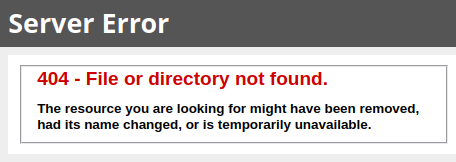
The raw HTML includes the CSS inline:
<!DOCTYPE html PUBLIC "-//W3C//DTD XHTML 1.0 Strict//EN" "http://www.w3.org/TR/xhtml1/DTD/xhtml1-strict.dtd">
<html xmlns="http://www.w3.org/1999/xhtml">
<head>
<meta http-equiv="Content-Type" content="text/html; charset=iso-8859-1"/>
<title>404 - File or directory not found.</title>
<style type="text/css">
<!--
body{margin:0;font-size:.7em;font-family:Verdana, Arial, Helvetica, sans-serif;background:#EEEEEE;}
fieldset{padding:0 15px 10px 15px;}
h1{font-size:2.4em;margin:0;color:#FFF;}
h2{font-size:1.7em;margin:0;color:#CC0000;}
h3{font-size:1.2em;margin:10px 0 0 0;color:#000000;}
#header{width:96%;margin:0 0 0 0;padding:6px 2% 6px 2%;font-family:"trebuchet MS", Verdana, sans-serif;color:#FFF;
background-color:#555555;}
#content{margin:0 0 0 2%;position:relative;}
.content-container{background:#FFF;width:96%;margin-top:8px;padding:10px;position:relative;}
-->
</style>
</head>
<body>
<div id="header"><h1>Server Error</h1></div>
<div id="content">
<div class="content-container"><fieldset>
<h2>404 - File or directory not found.</h2>
<h3>The resource you are looking for might have been removed, had its name changed, or is temporarily unavailable.</h3>
</fieldset></div>
</div>
</body>
</html>
Flask
Flask is a Python web framework. The default 404 page looks like:

The source is simple:
<!doctype html>
<html lang=en>
<title>404 Not Found</title>
<h1>Not Found</h1>
<p>The requested URL was not found on the server. If you entered the URL manually please check your spelling and try again.</p>
Generated by this exception:
class NotFound(HTTPException):
"""*404* `Not Found`
Raise if a resource does not exist and never existed.
"""
code = 404
description = (
"The requested URL was not found on the server. If you entered"
" the URL manually please check your spelling and try again."
)
That exception is printed using the get_body function in that same file:
def get_body(
self,
environ: WSGIEnvironment | None = None,
scope: dict[str, t.Any] | None = None,
) -> str:
"""Get the HTML body."""
return (
"<!doctype html>\n"
"<html lang=en>\n"
f"<title>{self.code} {escape(self.name)}</title>\n"
f"<h1>{escape(self.name)}</h1>\n"
f"{self.get_description(environ)}\n"
)
Django
Django is a Python web framework. It’s 404 page is very similar to Apache and Flask:

The HTML looks like:
<!doctype html>
<html lang="en">
<head>
<title>Not Found</title>
</head>
<body>
<h1>Not Found</h1><p>The requested resource was not found on this server.</p>
</body>
</html>
It comes from the this function, which if not 404 template is set, calls the ERROR_PAGE_TEMPLATE with this title and details.
FastAPI
FastAPI is a Python web framework based on Python type hints. When a path is not found, it returns JSON saying so:

Firefox will often display this in a formatted manner:

AIOHTTP
AIOHTTP is a “Asynchronous HTTP Client/Server for asyncio and Python.” The default 404 is simply the code and text:

There’s no HTML, just the plaintext. It is generated from the web_exceptions.py file that defines the various exceptions, including HTTPNotFound:
class HTTPNotFound(HTTPClientError):
status_code = 404
The HTTPClientError class defines the text as:
if text is None:
if not self.empty_body:
text = f"{self.status_code}: {reason}"
status_code is set at the bottom of the file, pulling from the http module:
def _initialize_default_reason() -> None:
for obj in globals().values():
if isinstance(obj, type) and issubclass(obj, HTTPException):
if obj.status_code >= 0:
try:
status = HTTPStatus(obj.status_code)
obj.default_reason = status.phrase
except ValueError:
pass
_initialize_default_reason()
del _initialize_default_reason
I can generate these in a Python REPL:
oxdf@hacky$ python
Python 3.12.3 (main, Sep 11 2024, 14:17:37) [GCC 13.2.0] on linux
Type "help", "copyright", "credits" or "license" for more information.
>>> import http
>>> http.HTTPStatus(404)
<HTTPStatus.NOT_FOUND: 404>
>>> http.HTTPStatus(404).phrase
'Not Found'
Fiber
Fiber is a Go based web framework where the default 404 returns only a text string including the path:

The text is exactly the same as Express, but there’s no HTML in this case.
The source is very simple:
// If c.Next() does not match, return 404
err := NewError(StatusNotFound, "Cannot "+c.Method()+" "+c.getPathOriginal())
Gin
Gin is another Go based web framework where the default 404 page is also just text:

This message is defined on a single line:
var (
default404Body = []byte("404 page not found")
default405Body = []byte("405 method not allowed")
)
PHP-FPM
PHP FastCGI Process Manager, or PHP-FPM, is the PHP implementation for taking requests from a webserver like Apache or nginx and managing processes to handle the PHP execution of the requested URL / page. If the server passes the page to PHP-FPM, and it can’t find the page, it simply returns the text “File not found.\n”:

This comes from this code:
zend_try {
zlog(ZLOG_DEBUG, "Primary script unknown");
SG(sapi_headers).http_response_code = 404;
PUTS("File not found.\n");
} zend_catch {
} zend_end_try();
goto fastcgi_request_done;
PHP-FPM will typically be behind another webserver like Apache, so /doesnotexist will return the Apache 404, but /doesnotexist.php will be forwarded by the webserver to PHP-FPM, where it returns 404.
Laravel
Laravel is a PHP web framework. The default 404 page looks like:
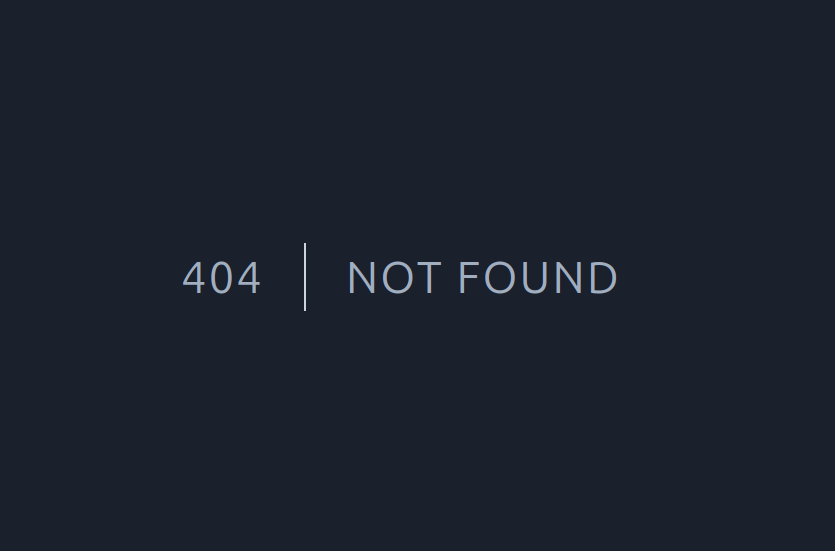
The HTML source for this page is a bit longer, as it includes style information:
<!DOCTYPE html>
<html lang="en">
<head>
<meta charset="utf-8">
<meta name="viewport" content="width=device-width, initial-scale=1">
<title>Not Found</title>
<style>
/*! normalize.css v8.0.1 | MIT License | github.com/necolas/normalize.css */html{line-height:1.15;-webkit-text-size-adjust:100%}body{margin:0}a{background-color:transparent}code{font-family:monospace,monospace;font-size:1em}[hidden]{display:none}html{font-family:system-ui,-apple-system,BlinkMacSystemFont,Segoe UI,Roboto,Helvetica Neue,Arial,Noto Sans,sans-serif,Apple Color Emoji,Segoe UI Emoji,Segoe UI Symbol,Noto Color Emoji;line-height:1.5}*,:after,:before{box-sizing:border-box;border:0 solid #e2e8f0}a{color:inherit;text-decoration:inherit}code{font-family:Menlo,Monaco,Consolas,Liberation Mono,Courier New,monospace}svg,video{display:block;vertical-align:middle}video{max-width:100%;height:auto}.bg-white{--bg-opacity:1;background-color:#fff;background-color:rgba(255,255,255,var(--bg-opacity))}.bg-gray-100{--bg-opacity:1;background-color:#f7fafc;background-color:rgba(247,250,252,var(--bg-opacity))}.border-gray-200{--border-opacity:1;border-color:#edf2f7;border-color:rgba(237,242,247,var(--border-opacity))}.border-gray-400{--border-opacity:1;border-color:#cbd5e0;border-color:rgba(203,213,224,var(--border-opacity))}.border-t{border-top-width:1px}.border-r{border-right-width:1px}.flex{display:flex}.grid{display:grid}.hidden{display:none}.items-center{align-items:center}.justify-center{justify-content:center}.font-semibold{font-weight:600}.h-5{height:1.25rem}.h-8{height:2rem}.h-16{height:4rem}.text-sm{font-size:.875rem}.text-lg{font-size:1.125rem}.leading-7{line-height:1.75rem}.mx-auto{margin-left:auto;margin-right:auto}.ml-1{margin-left:.25rem}.mt-2{margin-top:.5rem}.mr-2{margin-right:.5rem}.ml-2{margin-left:.5rem}.mt-4{margin-top:1rem}.ml-4{margin-left:1rem}.mt-8{margin-top:2rem}.ml-12{margin-left:3rem}.-mt-px{margin-top:-1px}.max-w-xl{max-width:36rem}.max-w-6xl{max-width:72rem}.min-h-screen{min-height:100vh}.overflow-hidden{overflow:hidden}.p-6{padding:1.5rem}.py-4{padding-top:1rem;padding-bottom:1rem}.px-4{padding-left:1rem;padding-right:1rem}.px-6{padding-left:1.5rem;padding-right:1.5rem}.pt-8{padding-top:2rem}.fixed{position:fixed}.relative{position:relative}.top-0{top:0}.right-0{right:0}.shadow{box-shadow:0 1px 3px 0 rgba(0,0,0,.1),0 1px 2px 0 rgba(0,0,0,.06)}.text-center{text-align:center}.text-gray-200{--text-opacity:1;color:#edf2f7;color:rgba(237,242,247,var(--text-opacity))}.text-gray-300{--text-opacity:1;color:#e2e8f0;color:rgba(226,232,240,var(--text-opacity))}.text-gray-400{--text-opacity:1;color:#cbd5e0;color:rgba(203,213,224,var(--text-opacity))}.text-gray-500{--text-opacity:1;color:#a0aec0;color:rgba(160,174,192,var(--text-opacity))}.text-gray-600{--text-opacity:1;color:#718096;color:rgba(113,128,150,var(--text-opacity))}.text-gray-700{--text-opacity:1;color:#4a5568;color:rgba(74,85,104,var(--text-opacity))}.text-gray-900{--text-opacity:1;color:#1a202c;color:rgba(26,32,44,var(--text-opacity))}.uppercase{text-transform:uppercase}.underline{text-decoration:underline}.antialiased{-webkit-font-smoothing:antialiased;-moz-osx-font-smoothing:grayscale}.tracking-wider{letter-spacing:.05em}.w-5{width:1.25rem}.w-8{width:2rem}.w-auto{width:auto}.grid-cols-1{grid-template-columns:repeat(1,minmax(0,1fr))}@-webkit-keyframes spin{0%{transform:rotate(0deg)}to{transform:rotate(1turn)}}@keyframes spin{0%{transform:rotate(0deg)}to{transform:rotate(1turn)}}@-webkit-keyframes ping{0%{transform:scale(1);opacity:1}75%,to{transform:scale(2);opacity:0}}@keyframes ping{0%{transform:scale(1);opacity:1}75%,to{transform:scale(2);opacity:0}}@-webkit-keyframes pulse{0%,to{opacity:1}50%{opacity:.5}}@keyframes pulse{0%,to{opacity:1}50%{opacity:.5}}@-webkit-keyframes bounce{0%,to{transform:translateY(-25%);-webkit-animation-timing-function:cubic-bezier(.8,0,1,1);animation-timing-function:cubic-bezier(.8,0,1,1)}50%{transform:translateY(0);-webkit-animation-timing-function:cubic-bezier(0,0,.2,1);animation-timing-function:cubic-bezier(0,0,.2,1)}}@keyframes bounce{0%,to{transform:translateY(-25%);-webkit-animation-timing-function:cubic-bezier(.8,0,1,1);animation-timing-function:cubic-bezier(.8,0,1,1)}50%{transform:translateY(0);-webkit-animation-timing-function:cubic-bezier(0,0,.2,1);animation-timing-function:cubic-bezier(0,0,.2,1)}}@media (min-width:640px){.sm\:rounded-lg{border-radius:.5rem}.sm\:block{display:block}.sm\:items-center{align-items:center}.sm\:justify-start{justify-content:flex-start}.sm\:justify-between{justify-content:space-between}.sm\:h-20{height:5rem}.sm\:ml-0{margin-left:0}.sm\:px-6{padding-left:1.5rem;padding-right:1.5rem}.sm\:pt-0{padding-top:0}.sm\:text-left{text-align:left}.sm\:text-right{text-align:right}}@media (min-width:768px){.md\:border-t-0{border-top-width:0}.md\:border-l{border-left-width:1px}.md\:grid-cols-2{grid-template-columns:repeat(2,minmax(0,1fr))}}@media (min-width:1024px){.lg\:px-8{padding-left:2rem;padding-right:2rem}}@media (prefers-color-scheme:dark){.dark\:bg-gray-800{--bg-opacity:1;background-color:#2d3748;background-color:rgba(45,55,72,var(--bg-opacity))}.dark\:bg-gray-900{--bg-opacity:1;background-color:#1a202c;background-color:rgba(26,32,44,var(--bg-opacity))}.dark\:border-gray-700{--border-opacity:1;border-color:#4a5568;border-color:rgba(74,85,104,var(--border-opacity))}.dark\:text-white{--text-opacity:1;color:#fff;color:rgba(255,255,255,var(--text-opacity))}.dark\:text-gray-400{--text-opacity:1;color:#cbd5e0;color:rgba(203,213,224,var(--text-opacity))}}
</style>
<style>
body {
font-family: ui-sans-serif, system-ui, -apple-system, BlinkMacSystemFont, "Segoe UI", Roboto, "Helvetica Neue", Arial, "Noto Sans", sans-serif, "Apple Color Emoji", "Segoe UI Emoji", "Segoe UI Symbol", "Noto Color Emoji";
}
</style>
</head>
<body class="antialiased">
<div class="relative flex items-top justify-center min-h-screen bg-gray-100 dark:bg-gray-900 sm:items-center sm:pt-0">
<div class="max-w-xl mx-auto sm:px-6 lg:px-8">
<div class="flex items-center pt-8 sm:justify-start sm:pt-0">
<div class="px-4 text-lg text-gray-500 border-r border-gray-400 tracking-wider">
404 </div>
<div class="ml-4 text-lg text-gray-500 uppercase tracking-wider">
Not Found </div>
</div>
</div>
</div>
</body>
</html>
Laravel uses this template to display errors:
<div class="flex items-center pt-8 sm:justify-start sm:pt-0">
<div class="px-4 text-lg text-gray-500 border-r border-gray-400 tracking-wider">
@yield('code')
</div>
<div class="ml-4 text-lg text-gray-500 uppercase tracking-wider">
@yield('message')
</div>
And this view extends that to set the messages and code:
@extends('errors::minimal')
@section('title', __('Not Found'))
@section('code', '404')
@section('message', __('Not Found'))
Symfony
Symfony is another PHP framework with a default 404 page that looks like:

The raw HTML is:
<!DOCTYPE html>
<html lang="en">
<head>
<meta charset="UTF-8" />
<meta name="robots" content="noindex,nofollow,noarchive" />
<title>An Error Occurred: Not Found</title>
<link rel="icon" href="data:image/svg+xml,<svg xmlns=%22http://www.w3.org/2000/svg%22 viewBox=%220 0 128 128%22><text y=%221.2em%22 font-size=%2296%22>❌</text></svg>" />
<style>body { background-color: #fff; color: #222; font: 16px/1.5 -apple-system, BlinkMacSystemFont, "Segoe UI", Roboto, "Helvetica Neue", Arial, sans-serif; margin: 0; }
.container { margin: 30px; max-width: 600px; }
h1 { color: #dc3545; font-size: 24px; }
h2 { font-size: 18px; }</style>
</head>
<body>
<div class="container">
<h1>Oops! An Error Occurred</h1>
<h2>The server returned a "404 Not Found".</h2>
<p>
Something is broken. Please let us know what you were doing when this error occurred.
We will fix it as soon as possible. Sorry for any inconvenience caused.
</p>
</div>
</body>
</html>
It comes from this template.
Express
Express is a JavaScript NodeJS web framework. It’s 404 page is very short, giving the path that was not found:

The text is the same as Fiber, but Express has HTML around the text:
<!DOCTYPE html>
<html lang="en">
<head>
<meta charset="utf-8">
<title>Error</title>
</head>
<body>
<pre>Cannot GET /0xdf</pre>
</body>
</html>
NextJS
NextJS is a framework built on the React framework frontend and NodeJS on the backend. The 404 page looks similar to Laravel:
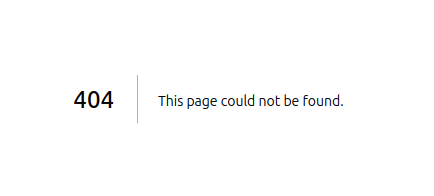
The HTML is on one line (shown here with line wrap):
<!DOCTYPE html><html><head><style data-next-hide-fouc="true">body{display:none}</style><noscript data-next-hide-fouc="true"><style>body{display:block}</style></noscript><meta charSet="utf-8"/><meta name="viewport" content="width=device-width"/><title>404: This page could not be found</title><meta name="next-head-count" content="3"/><noscript data-n-css=""></noscript><script defer="" nomodule="" src="/_next/static/chunks/polyfills.js"></script><script src="/_next/static/chunks/webpack.js" defer=""></script><script src="/_next/static/chunks/main.js" defer=""></script><script src="/_next/static/chunks/pages/_app.js" defer=""></script><script src="/_next/static/chunks/pages/_error.js" defer=""></script><script src="/_next/static/development/_buildManifest.js" defer=""></script><script src="/_next/static/development/_ssgManifest.js" defer=""></script><noscript id="__next_css__DO_NOT_USE__"></noscript></head><body><div id="__next"><div style="font-family:system-ui,"Segoe UI",Roboto,Helvetica,Arial,sans-serif,"Apple Color Emoji","Segoe UI Emoji";height:100vh;text-align:center;display:flex;flex-direction:column;align-items:center;justify-content:center"><div style="line-height:48px"><style>body{color:#000;background:#fff;margin:0}.next-error-h1{border-right:1px solid rgba(0,0,0,.3)}@media (prefers-color-scheme:dark){body{color:#fff;background:#000}.next-error-h1{border-right:1px solid rgba(255,255,255,.3)}}</style><h1 class="next-error-h1" style="display:inline-block;margin:0 20px 0 0;padding-right:23px;font-size:24px;font-weight:500;vertical-align:top">404</h1><div style="display:inline-block"><h2 style="font-size:14px;font-weight:400;line-height:28px">This page could not be found<!-- -->.</h2></div></div></div></div><script src="/_next/static/chunks/react-refresh.js"></script><script id="__NEXT_DATA__" type="application/json">{"props":{"pageProps":{"statusCode":404}},"page":"/_error","query":{},"buildId":"development","isFallback":false,"gip":true,"scriptLoader":[]}</script></body></html>
It comes from this source and this source.
Tomcat
Apache Tomcat is a web framework built in Java that use technology like Java Server Pages (JSP), Servlets, and Web Application Archives (WAR). It’s 404 page looks like:
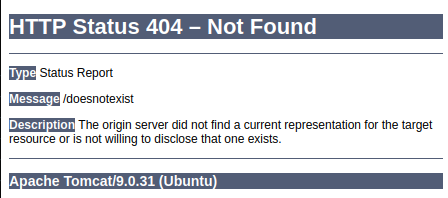
The HTML is one line (shown wrapped here):
<!doctype html><html lang="en"><head><title>HTTP Status 404 – Not Found</title><style type="text/css">body {font-family:Tahoma,Arial,sans-serif;} h1, h2, h3, b {color:white;background-color:#525D76;} h1 {font-size:22px;} h2 {font-size:16px;} h3 {font-size:14px;} p {font-size:12px;} a {color:black;} .line {height:1px;background-color:#525D76;border:none;}</style></head><body><h1>HTTP Status 404 – Not Found</h1><hr class="line" /><p><b>Type</b> Status Report</p><p><b>Message</b> /doesnotexist</p><p><b>Description</b> The origin server did not find a current representation for the target resource or is not willing to disclose that one exists.</p><hr class="line" /><h3>Apache Tomcat/9.0.31 (Ubuntu)</h3></body></html>
The error text is set on GitHub:
http.404.desc=The origin server did not find a current representation for the target resource or is not willing to disclose that one exists.
http.404.reason=Not Found
Spring Boot
Spring Boot is a Java web framework for creating Spring based web applications. The 404 page looks like:

The raw HTML is one line (shown here wrapped):
<html><body><h1>Whitelabel Error Page</h1><p>This application has no explicit mapping for /error, so you are seeing this as a fallback.</p><div id='created'>Wed Sep 25 12:55:53 UTC 2024</div><div>There was an unexpected error (type=Not Found, status=404).</div><div></div></body></html>
The source the generates this is in ErrorMvcAutoConfiguration.java on GitHub:
builder.append("<html><body><h1>Whitelabel Error Page</h1>")
.append("<p>This application has no explicit mapping for /error, so you are seeing this as a fallback.</p>")
.append("<div id='created'>")
.append(timestamp)
.append("</div>")
.append("<div>There was an unexpected error (type=")
.append(htmlEscape(model.get("error")))
.append(", status=")
.append(htmlEscape(model.get("status")))
.append(").</div>");
if (message != null) {
builder.append("<div>").append(htmlEscape(message)).append("</div>");
}
if (trace != null) {
builder.append("<div style='white-space:pre-wrap;'>").append(htmlEscape(trace)).append("</div>");
}
builder.append("</body></html>");
Jetty
Jetty is another Java web framework with a 404 page that looks like:
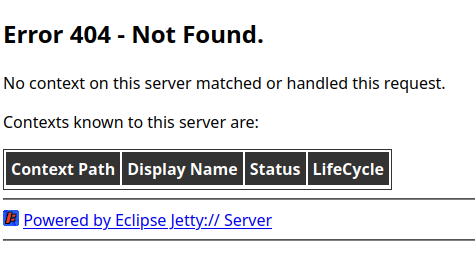
The HTML looks like:
<!DOCTYPE html>
<html lang="en">
<head>
<title>Error 404 - Not Found</title>
<meta charset="utf-8">
<style>body { font-family: sans-serif; } table, td { border: 1px solid #333; } td, th { padding: 5px; } thead, tfoot { background-color: #333; color: #fff; } </style>
</head>
<body>
<h2>Error 404 - Not Found.</h2>
<p>No context on this server matched or handled this request.</p>
<p>Contexts known to this server are:</p>
<table class="contexts"><thead><tr><th>Context Path</th><th>Display Name</th><th>Status</th><th>LifeCycle</th></tr></thead><tbody>
</tbody></table><hr/>
<a href="https://jetty.org"><img alt="icon" src="/favicon.ico"/></a> <a href="https://jetty.org">Powered by Eclipse Jetty:// Server</a><hr/>
</body>
</html>
This is generated in this code.
Ruby on Rails
Ruby on Rails is a Ruby web framework with a 404 page that looks like:
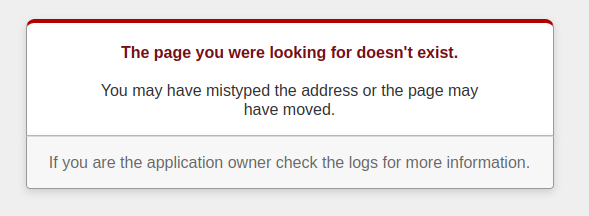
The HTML is long because it includes the CSS information:
<!DOCTYPE html>
<html>
<head>
<title>The page you were looking for doesn't exist (404)</title>
<meta name="viewport" content="width=device-width,initial-scale=1">
<style>
.rails-default-error-page {
background-color: #EFEFEF;
color: #2E2F30;
text-align: center;
font-family: arial, sans-serif;
margin: 0;
}
.rails-default-error-page div.dialog {
width: 95%;
max-width: 33em;
margin: 4em auto 0;
}
.rails-default-error-page div.dialog > div {
border: 1px solid #CCC;
border-right-color: #999;
border-left-color: #999;
border-bottom-color: #BBB;
border-top: #B00100 solid 4px;
border-top-left-radius: 9px;
border-top-right-radius: 9px;
background-color: white;
padding: 7px 12% 0;
box-shadow: 0 3px 8px rgba(50, 50, 50, 0.17);
}
.rails-default-error-page h1 {
font-size: 100%;
color: #730E15;
line-height: 1.5em;
}
.rails-default-error-page div.dialog > p {
margin: 0 0 1em;
padding: 1em;
background-color: #F7F7F7;
border: 1px solid #CCC;
border-right-color: #999;
border-left-color: #999;
border-bottom-color: #999;
border-bottom-left-radius: 4px;
border-bottom-right-radius: 4px;
border-top-color: #DADADA;
color: #666;
box-shadow: 0 3px 8px rgba(50, 50, 50, 0.17);
}
</style>
</head>
<body class="rails-default-error-page">
<!-- This file lives in public/404.html -->
<div class="dialog">
<div>
<h1>The page you were looking for doesn't exist.</h1>
<p>You may have mistyped the address or the page may have moved.</p>
</div>
<p>If you are the application owner check the logs for more information.</p>
</div>
</body>
</html>
This template is defined on GitHub.
Sinatra
Sinatra is a Ruby web application framework with a 404 page that looks like:
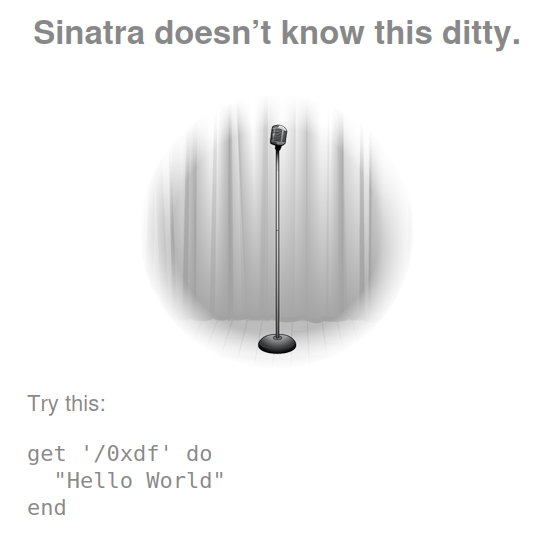
It shows the failed path (in this case /0xdf) and suggests what to add to the Ruby file to make that path exist.
The HTML looks like:
<!DOCTYPE html>
<html>
<head>
<style type="text/css">
body { text-align:center;font-family:helvetica,arial;font-size:22px;
color:#888;margin:20px}
#c {margin:0 auto;width:500px;text-align:left}
</style>
</head>
<body>
<h2>Sinatra doesn’t know this ditty.</h2>
<img src='http://10.10.11.253:3000/__sinatra__/404.png'>
<div id="c">
Try this:
<pre>get '/0xdf' do
"Hello World"
end
</pre>
</div>
</body>
</html>
It comes from this source.
ASP.NET
ASP.NET frameworks like ASP.NET Core and ASP.NET MVC are cross-platform web framework build on .NET, though typically seen on Windows hosts. The default 404 page looks like:
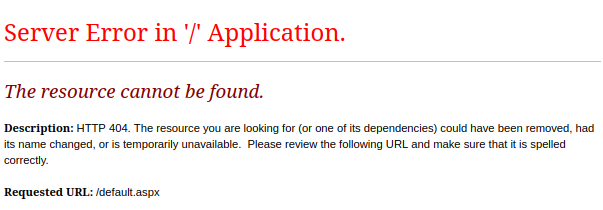
The raw HTML is:
<!DOCTYPE html>
<html>
<head>
<title>The resource cannot be found.</title>
<meta name="viewport" content="width=device-width" />
<style>
body {font-family:"Verdana";font-weight:normal;font-size: .7em;color:black;}
p {font-family:"Verdana";font-weight:normal;color:black;margin-top: -5px}
b {font-family:"Verdana";font-weight:bold;color:black;margin-top: -5px}
H1 { font-family:"Verdana";font-weight:normal;font-size:18pt;color:red }
H2 { font-family:"Verdana";font-weight:normal;font-size:14pt;color:maroon }
pre {font-family:"Consolas","Lucida Console",Monospace;font-size:11pt;margin:0;padding:0.5em;line-height:14pt}
.marker {font-weight: bold; color: black;text-decoration: none;}
.version {color: gray;}
.error {margin-bottom: 10px;}
.expandable { text-decoration:underline; font-weight:bold; color:navy; cursor:hand; }
@media screen and (max-width: 639px) {
pre { width: 440px; overflow: auto; white-space: pre-wrap; word-wrap: break-word; }
}
@media screen and (max-width: 479px) {
pre { width: 280px; }
}
</style>
</head>
<body bgcolor="white">
<span><H1>Server Error in '/' Application.<hr width=100% size=1 color=silver></H1>
<h2> <i>The resource cannot be found.</i> </h2></span>
<font face="Arial, Helvetica, Geneva, SunSans-Regular, sans-serif ">
<b> Description: </b>HTTP 404. The resource you are looking for (or one of its dependencies) could have been removed, had its name changed, or is temporarily unavailable. Please review the following URL and make sure that it is spelled correctly.
<br><br>
<b> Requested URL: </b>/default.aspx<br><br>
</body>
</html>
ASP.NET applications are typically hosted behind a webserver like IIS, so /doesnotexist may result in the IIS 404, where as /doesnotexist.aspx could be routed through to ASP.NET where it returns the ASP.NET 404 page.
Blazor
The Blazor web framework is built into ASP.NET Core, and is a .NET and C# frontend framework for building interactive web applications without JavaScript. The default 404 page looks like:

This message is a component, and can be put within other templates. For example, on the Blazorized HTB machine:
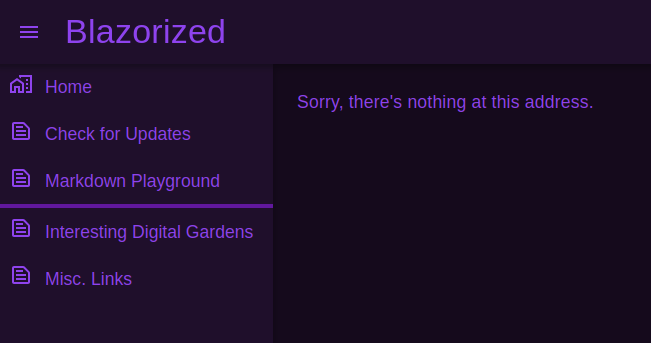
It has that component within the template for that machine.
The component looks like:
<p role="alert">Sorry, there's nothing at this address.</p>
This component is defined several times in the dotnet/aspnetcore repo as shown on grep.app with grep.app.